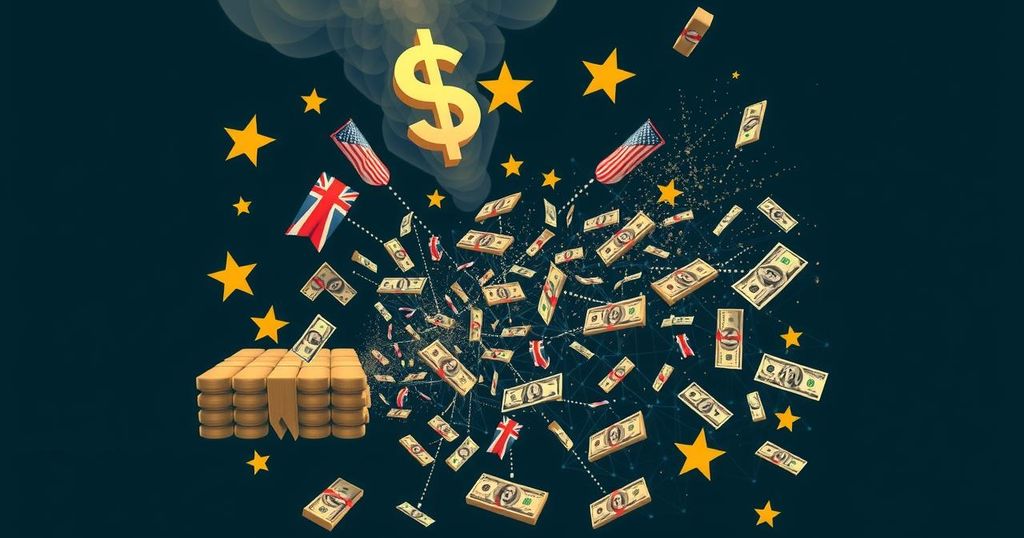Politics
2024 PRESIDENTIAL ELECTION, AFRICA, ASIA, BIDEN, BUREAU OF INVESTIGATIVE JOURNALISM, DEMOS, DONALD TRUMP, ELECTION, HANNAH PERRY, MEDIA, MEDIA COVERAGE, NATIONAL SECURITY, NIGERIA, NORTH AMERICA, OHIO, PHILIPPINES, SPRINGFIELD, TRUMP, TRUMP ADMINISTRATION, UNITED PATRIOT, UNITED STATES, US
Jamal Walker
0 Comments
Exploitative Practices in U.S. Election: Profiteering from Conspiracies and Hate
Online operations are increasingly profiting from U.S. election-related conspiracies and hate speech, promoting inflammatory merchandise and engaging in scams. Entities like United Patriot capitalize on emotional engagement, raising millions through deceptive advertising measures, often operated from overseas. This growing trend showcases the exploitation of political content for financial gain, highlighting significant issues surrounding digital misinformation and the accountability of social media platforms.
In recent times, a concerning trend has emerged where online operators exploit U.S. election-related conspiracy theories and hate speech for monetary gain. Merchandising platforms like United Patriot are capitalizing on emotional engagement by selling politically charged items, including a T-shirt with AI-generated cats donning MAGA-style hats, referenced from a racially motivated falsehood circulated by Donald Trump regarding Haitian migrants. This form of commerce, steeped in misinformation and hatred, is part of a broader issue linked to the international internet economy, where such narratives are monetized through engagement-driven advertising algorithms. Several companies have been identified using these tactics, with their ads acquiring impressive reach on social media platforms like Facebook. These operators often claim patriotic motives; however, many appear to be operated from overseas. For instance, the Bureau of Investigative Journalism (TBIJ) identified extensive political advertising from these entities that falls into a troubling pattern of promoting false claims and divisive narratives to inflate their visibility and, consequently, their profits. This environment was further exacerbated by major conspiracy theories gaining traction, targeting politically vulnerable audiences in the United States. A parallel concern arises with platforms employing sensationalist content to attract users, which ranges from political misinformation to scams, such as those promoting sports betting with inflating potential returns. Nigeria-based operations have effectively used U.S. political content to engage international audiences while defrauding individuals out of their money through elaborate betting schemes. Thus, these entities showcase a multifaceted approach: while some are directly selling merchandise rooted in bigotry and xenophobia, others utilize fear and conspiracy to draw users toward predatory financial schemes, all while remaining insulated from accountability due to their convoluted operational structures. Furthermore, this exploitation of polarizing content highlights the need for accountability among social media platforms, which facilitate these dynamics through engagement-driven algorithms. Individuals like Frances Haugen, a former employee of Facebook, have highlighted how such algorithms inherently promote harmful content, indicating a pressing need for reforms that can limit the impact of these entities. In essence, this phenomenon underscores the intersection of misinformation, exploitation, and digital engagement tactics, raising critical questions about the integrity of online discourse and the efficacy of existing regulatory frameworks.
The exploitation of U.S. election-related conspiracies and hate speech by profit-driven entities represents a significant challenge to democratic norms and societal cohesion. As political discourse becomes increasingly polarized, various online platforms have become breeding grounds for misinformation, with algorithms designed to maximize engagement inadvertently promoting content that fosters division and encourages unscrupulous economic practices. This trend highlights the implications of the political climate on both national and international stages, reflecting broader patterns whereby bad actors manipulate socio-political vulnerabilities for financial gain, often at the expense of community trust and safety.
The ongoing exploitation of political conspiracies and hate speech for profit highlights a disturbing trend in digital commerce, where misinformation is commodified by both international and domestic entities. This raises critical issues concerning the role of social media algorithms in promoting divisive content and the urgent need for regulatory reforms to counteract these harmful practices. The case of United Patriot and similar operations exemplifies how individuals may exploit emotional vulnerabilities tied to political narratives, thereby necessitating more robust protections for citizens against such predatory behaviors. The intersection of misinformation and financial exploitation underscores the need for heightened scrutiny of digital marketing practices and greater accountability for social media platforms to foster a healthier online discourse.
Original Source: www.wired.com




Post Comment